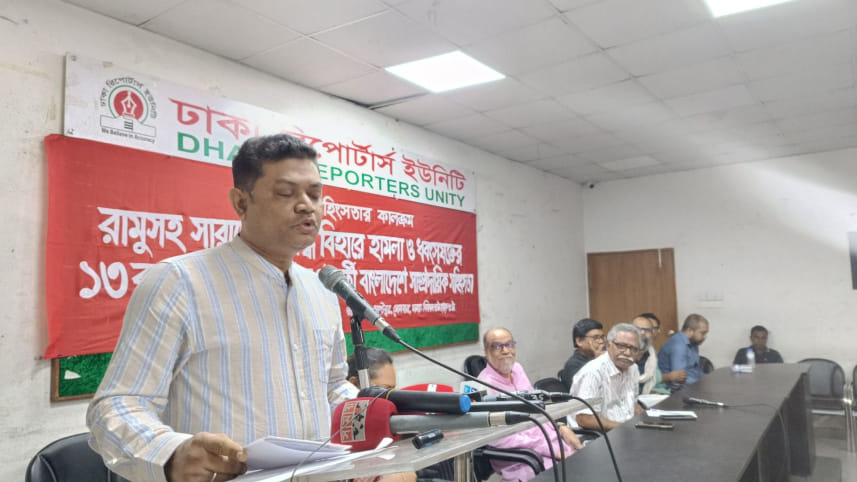'In Ramu, kerosene was supplied by one party, trucks by another, matches by a third'

Thirteen years after the Ramu attacks in Cox's Bazar, where Buddhist temples and homes were burnt down, justice has still not been delivered in most cases, Barrister Jyotirmoy Barua, a member of Ganantrik Odhikar Committee, said today.
The Supreme Court lawyer said a total of 19 cases were filed over the violence, but investigations in most of them have not been completed.
"One of the complainants have already withdrawn his case. The judicial inquiry report submitted to the Supreme Court is still locked inside a trunk because we fear that opening it may put people at risk again," he said.
He made these remarks at an event titled, "Timeline of Communal Violence: 13 Years Since the Ramu Buddhist Temple Attacks and Communal Violence in the Post-Uprising Bangladesh", organised by the Ganatantrik Odhikar Committee at the Dhaka Reporters Unity.
Recalling the incidents of September 29 and 30, 2012, he said at least 13 temples were attacked in Ramu, four in Ukhiya, and two in Patiya. More than 50 homes were set on fire.
Locals submitted video evidence back then.
"In some of those videos, you can clearly see law enforcement personnel standing near the temples. The attackers walked past them and set the temples on fire. They did not fire even a single tear shell," he said.
He described how a fake Facebook post was used to incite violence in Ramu.
"A tailor named Uttam Barua did not even own a smartphone. Yet a fake Facebook post was printed out and circulated in the market. Then announcements were made through loudspeakers to gather people. The same pattern was later used in Cumilla, Rangpur, Satkhira and even in cases where people were killed by mobs on suspicion of insulting religion," he said.
According to him, in cases of communal violence, political actors provide protection and supplies.
"In Ramu, kerosene was supplied by one party, trucks by another and matches by a third. In almost every attack I have investigated, leaders or activists of mainstream parties were involved -- Awami League, BNP, Jamaat or Jatiya Party," he said.
Barrister Barua warned that the damage caused by communal attacks is not only physical but also psychological.
"Legal punishment cannot heal the mental wounds. When someone is attacked for their identity, they lose trust in society. That pain is never discussed in Bangladesh. There is no treatment for that trauma," he said.
He called on the state to acknowledge its responsibility. "The constitution says people will define their own identity. But in this country, the state always tries to define people. That is where the problem begins," he said.
"If the state wants to rebuild harmony, it must first admit its failures and treat these wounds," he said.



 For all latest news, follow The Daily Star's Google News channel.
For all latest news, follow The Daily Star's Google News channel.
Comments